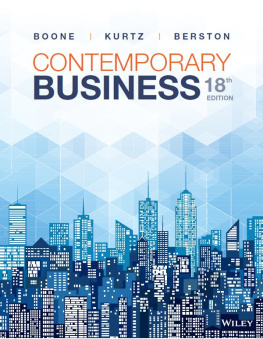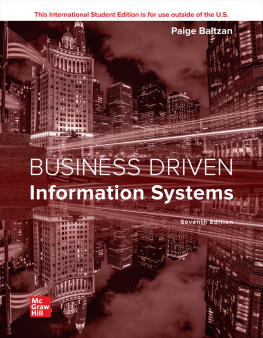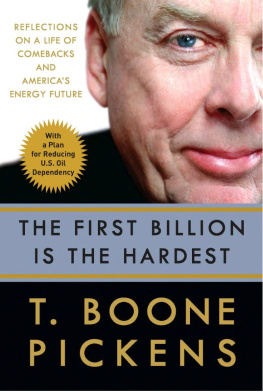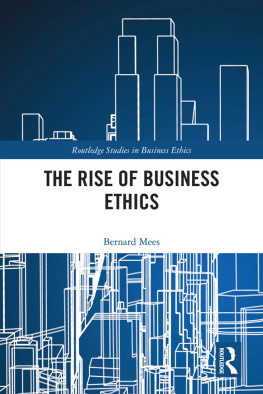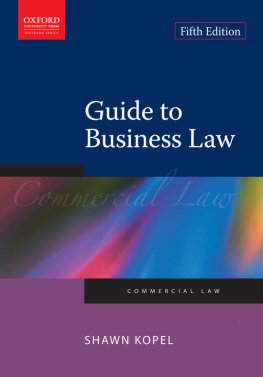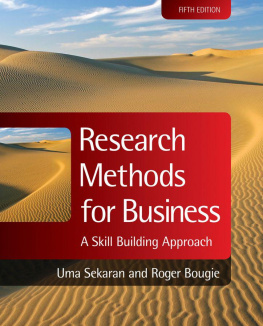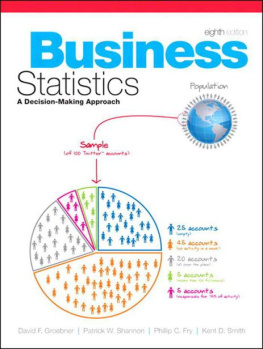Louis E. Boone - Contemporary Business
Here you can read online Louis E. Boone - Contemporary Business full text of the book (entire story) in english for free. Download pdf and epub, get meaning, cover and reviews about this ebook. year: 2019, publisher: Wiley, genre: Business. Description of the work, (preface) as well as reviews are available. Best literature library LitArk.com created for fans of good reading and offers a wide selection of genres:
Romance novel
Science fiction
Adventure
Detective
Science
History
Home and family
Prose
Art
Politics
Computer
Non-fiction
Religion
Business
Children
Humor
Choose a favorite category and find really read worthwhile books. Enjoy immersion in the world of imagination, feel the emotions of the characters or learn something new for yourself, make an fascinating discovery.
- Book:Contemporary Business
- Author:
- Publisher:Wiley
- Genre:
- Year:2019
- Rating:3 / 5
- Favourites:Add to favourites
- Your mark:
- 60
- 1
- 2
- 3
- 4
- 5
Contemporary Business: summary, description and annotation
We offer to read an annotation, description, summary or preface (depends on what the author of the book "Contemporary Business" wrote himself). If you haven't found the necessary information about the book — write in the comments, we will try to find it.
Contemporary Business, 18th Edition, is a student friendly, engaging product designed to attract students to the field of business. Boone 18e offers a comprehensive approach to the material that will cater to a wide variety of students with different learning needs. Up-to-date content is vital to any Intro to Business course and Boone 18e with its contemporary style, wealth of new examples, and hot business topics can deliver that currency.
Contemporary Business — read online for free the complete book (whole text) full work
Below is the text of the book, divided by pages. System saving the place of the last page read, allows you to conveniently read the book "Contemporary Business" online for free, without having to search again every time where you left off. Put a bookmark, and you can go to the page where you finished reading at any time.
Font size:
Interval:
Bookmark:
Toys R Us, an American toy, clothing, video game, and baby product retailer founded in New Jersey over 70 years ago, announced that it would close all its U.S. stores. However, just a few months prior, its CEO had mapped out a goal of upgrading online sales, renovating stores, and introducing augmented reality into the toy shopping experience. To achieve those goals, the company planned to close a few hundred stores so that the remaining stores could become healthier. The turn of events came as a surprise to those who thought that the retailer would simply reorganize in order to survive.
A few missteps point to the toy retailer's demisethe first of which happened to be its heavy debt load. Saddled with heavy debt when purchased by private equity firms Bain Capital and Kohlberg Kravis Roberts in 2005, not much had changed by 2017. The debt load stood at about $5 billion. Filing for
As the opening story points out, legal issues (such as bankruptcy law) affect every aspect of business. Despite the best efforts of most businesspeople, legal issues do arise. A dispute may arise over a contract, an employee may file a lawsuit for wrongful termination, or a town may challenge the environmental impact of a new gas station. Unfortunately, the United States has the dubious distinction of being the world's most litigious society. Lawsuits are as common as business deals. Consider Walmart, which is involved in ongoing lawsuits from customers and employees for issues ranging from unsafe shopping environments to religious, sex, and pay discrimination.
Even if you are never involved in a lawsuit, the cost still affects you. The average U.S. family pays a hidden litigation tax of 5% each year because of the costs of lawsuits that force businesses to increase their prices. Small businesses, such as dentists' offices, doctors' offices, and daycare providers are often the hardest hit and may cut back on their services or close. One example of a frivolous lawsuit occurred when an animal rights group filed a lawsuit on behalf of a female monkey asserting that the monkey should enjoy copyright protection on a selfie she took when she swiped a photographer's camera out of his hands. The photographer claims to own the picture. Rule 11 of the Federal Rules of Civil Procedure was designed in 1993 to prevent frivolous lawsuits, but has been weakened by loopholes.
There are ongoing proposals for new laws intended to protect businesses, consumers, and the general publicbut somehow they fall short. In addition, laws that no longer serve a purpose are still on the books. For instance, in Alaska, it's illegal to wake a bear to take its picture, but it is perfectly legal to shoot a bear while it is sleeping. In Hawaii, it is against the law to insert pennies in your ear. In Louisiana, it is illegal to gargle in public. In Montana, it is against the law to operate a vehicle with ice picks attached to the wheels. In North Carolina, it is illegal to use elephants to plow cotton fields. And in Arizona, it's illegal to hunt camels. The origins of these laws raise about as many questions as the laws themselves.
Legislation that specifically affects how business functions is analyzed in each chapter of this book.. Finally, legislation pertaining to banking and the securities markets is discussed in Chapters 16 and 17.
In this appendix, we provide a general perspective of legislation at the federal, state, and local levels, and point out that, although business executives may not be legal experts, they do need to be knowledgeable and aware of laws in their specific area of responsibility. A good amount of common sense also helps avoid potential legal problems. This appendix looks at the general nature of business law, the court system, basic legal concepts, and the changing regulatory environment for U.S. business. Let's start with some initial definitions and related examples.
The , or court system, is the branch of government responsible for settling disputes among parties by applying laws. This branch consists of several types and levels of courts, each with a specific jurisdiction. Court systems are organized at the federal, state, and local levels. Administrative agencies also perform some limited judicial functions, but these agencies are more properly regarded as belonging to the executive or legislative branches of government.
At both the federal and state levels, trial courtscourts of general jurisdictionhear a wide range of cases. Unless a case is assigned by law to another court or to an administrative agency, a court of general jurisdiction will hear it. The majority of cases, both criminal and civil, pass through these courts. Within the federal system, trial courts are known as U.S. district courts, and at least one such court operates in each state. In state court systems, the general jurisdiction courts are often called circuit courts, and states typically provide one for each county. Other names for general jurisdiction courts are superior courts, common pleas courts, or district courts.
State judiciary systems also include many courts with lower, or more specific, jurisdictions. In most states, parties can appeal the decisions of the lower courts to the general jurisdiction courts. Examples of lower courts are probate courtswhich settle the estates of people who have diedand small-claims courtswhere people can represent themselves in suits involving limited amounts of money. For example, a landlord might go to small-claims court to settle a dispute with a tenant over a security deposit.
Decisions made at the general trial court level may be appealed in appellate courts. Both the federal and state systems have appellate courts. For instance, the U.S. Court of Appeals for the Fourth Circuit, which is based in Richmond, Virginia, covers the states of Maryland, Virginia, West Virginia, North Carolina, and South Carolina. The appeals process allows a higher court to review the case and correct any lower court error indicated by the appellant, the party making the appeal.
Appeals from decisions of the U.S. circuit courts of appeals can go all the way to the nation's highest court, the U.S. Supreme Court. Appeals from state courts of appeal are heard by the highest court in each state, usually called the state supreme court. In a state without intermediate appellate courts, the state supreme court hears appeals directly from the trial courts. Parties who are not satisfied by the verdict of a state supreme court can appeal to the U.S. Supreme Court and may be granted a hearing if they can cite grounds for such an appeal, and if the Supreme Court considers the case significant enough to be heard. The Supreme Court typically has 7,000 to 8,000 cases on the docket per year. However, only about 100 are granted review with oral arguments by attorneys. Formal written decisions are delivered for about 80 of those cases.
While most cases are resolved by the system of courts described here, certain highly specialized cases require particular expertise. Examples of specialized federal courts are the U.S. Tax Court for tax cases and the U.S. Court of Claims, which hears claims against the U.S. government itself. Similar specialized courts operate at the state level.
Administrative agencies, also known as bureaus, commissions, or boards, decide a variety of cases at all levels of government. These agencies usually derive their powers and responsibilities from state or federal statutes. Technically, they conduct hearings or inquiries rather than trials. Examples of federal administrative agencies are the Federal Trade Commission (FTC), the National Labor Relations Board (NLRB), and the Federal Energy Regulatory Commission (FERC). The FTC has the broadest power of any of the federal regulatory agencies. It enforces laws regulating unfair business practices, and it can stop false and deceptive advertising practices. Examples at the state level include public utility commissions and boards that govern the licensing of various trades and professions. Zoning boards, planning commissions, and boards of appeal operate at the city or county level.
Font size:
Interval:
Bookmark:
Similar books «Contemporary Business»
Look at similar books to Contemporary Business. We have selected literature similar in name and meaning in the hope of providing readers with more options to find new, interesting, not yet read works.
Discussion, reviews of the book Contemporary Business and just readers' own opinions. Leave your comments, write what you think about the work, its meaning or the main characters. Specify what exactly you liked and what you didn't like, and why you think so.

